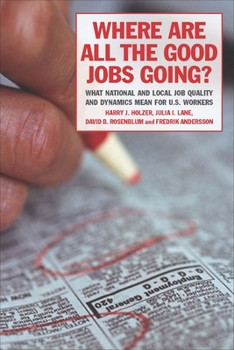Where Are All the Good Jobs Going?: What National and Local Job Quality and Dynamics Mean for U.S. Workers
Deindustrialization in the United States has triggered record-setting joblessness in manufacturing centers from Detroit to Baltimore. At the same time, global competition and technological change have actually stimulated both new businesses and new jobs. The jury is still out, however, on how many of these positions represent a significant source of long-term job quality and security. Where Are All the Good Jobs Going? addresses the most pressing questions for today's workers: whether the U.S. labor market can still produce jobs with good pay and benefits for the majority of workers and whether these jobs can remain stable over time. What constitutes a "good" job, who gets them, and are they becoming more or less secure? Where Are All the Good Jobs Going? examines U.S. job quality and volatility from the perspectives of both workers and employers. The authors analyze the Longitudinal Employer Household Dynamics (LEHD) data compiled by the U.S. Census Bureau, and the book covers data for twelve states during twelve years, 1992-2003, resulting in an unprecedented examination of workers and firms in several industries over time. Counter to conventional wisdom, the authors find that good jobs are not disappearing, but their character and location have changed. The market produces fewer good jobs in manufacturing and more in professional services and finance. Not surprisingly, the best jobs with the highest pay still go to the most educated workers. The most vulnerable workers--older, low-income, and low-skilled--work in the most insecure environments where they can be easily downsized or displaced by a fickle labor market. A higher federal minimum wage and increased unionization can contribute to the creation of well paying jobs. So can economic strategies that help smaller metropolitan areas support new businesses. These efforts, however, must function in tandem with policies that prepare workers for available positions, such as improving general educational attainment and providing career education. Where Are All the Good Jobs Going? makes clear that future policies will need to address not only how to produce good jobs but how to produce good workers. This cohesive study takes the necessary first steps with a sensible approach to the needs of workers and the firms that hire them.
Format:Paperback
Language:English
ISBN:087154458X
ISBN13:9780871544582
Release Date:January 2011
Publisher:Russell Sage Foundation
Length:224 Pages
Weight:0.25 lbs.
Dimensions:0.8" x 6.1" x 8.9"
Related Subjects
Business Business & Investing Economics Political Science Politics & Social SciencesCustomer Reviews
0 rating





